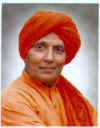|
Page 2 of 4
Peace in South Asia - is it
attainable?
the-south-asian
asks Swami Agnivesh
&
Rev. Valson Thampu
(cntd.)


Swami Agnivesh & Rev. Valson Thampu
"...every religion has been degraded into an alibi for war."
What, in
your view, should be the steps towards peace in south Asia?
On way or the other, the degradation and abuse of religion underlies most of
the conflicts in this region. All religions preach peace. But every religion
has been degraded into an alibi for war. The poison of religious
fundamentalism makes religions convulse into conflicts. Peace in South Asia
is impossible without peace among religions. Even though religions have
co-existed, so to speak, in this region for millennia, they have remained
insulated from each other and continued in a state of mutual alienation and
distrust. Religious leaders are rarely interested in anything more than
"constituency-building". They entrap their followers in religious
ghettos and promote blind faith so as to manipulate them at will. The
escapist religiosity that results from this has been degraded further by
communal politics that is ready to erupt into unspeakable cruelties. We
urgently need to create a new era of inter-faith cooperation in addressing
the burning issues of our people: especially issues pertaining to social
justice. There is a necessary connection between injustice and violence. No
society that denies justice to its own people can receive or enjoy the gift
of peace. Sadly, religions tend to sanitize and perpetuate injustice, as in
the case of the caste system in India.
The second area of priority is regional unity. The chronic disunity in this
region has both endemic and extraneous ingredients. Chief among the endemic
factors is out tribal mindset. Most of us cannot look beyond, or enlarge our
sympathies to transcend, the limited range of our interests. For most
people, family is all that matters and, sadly, it is the eagerness to
maximize the interests of one's own family that fuels corruption in our
societies. People, when communally or politically manipulated, become
active within a larger frame of reference; but only in a divisive and
disruptive fashion. Hardly anyone in the South Asian context thinks and
chooses in terms of what is good for one's own country as a whole, much less
for the whole region. In fact, patriotism is defined here merely as the
willingness to hate neighboring countries. Whether or not one's own country
is loved is almost immaterial. It is this endemic disunity that invites and
enables forces extraneous to this region to exploit us to the hilt.
International players find it easy to infiltrate South Asia and foment
conflicts to our detriment and to their benefit. The global
military-industrial combine is keen to keep South Asia boiling to ensure a
ready market for their military junk. In this, the ruling elites in the
nations of this region are hand-in-glove with these global predators. They
are, in point of fact, the enemies of our societies, even though they don
the masks of heroes and saviors. It is basic to peace in this region that a
doctrine of regional cooperation be evolved and popularized in South Asia as
a whole so as to detoxify the popular mind of the poison of divisive
propaganda that has gone on for decades.
Third, a model of economic development that harmonizes with the regional and
spiritual genius of the people in this area must be developed. Free Market
and unbridled consumerism have already aggravated social inequalities in
this region to the extent of endangering the health and wholeness of our
societies. Escalating poverty, mounting social alienation and tension,
hunger and human degradation, rising resentment at organized exploitation,
as well as an overwhelming sense of desperation have together submerged
South Asia already into an ocean of cynicism about justice and peace in this
region. Only from the height of idiocy or the depth of lunacy can we expect
that peace will eventuate somehow from a process of organized injustice and
exploitation. Ironically, it is in their efforts to do greater justice to
their own citizens that governments of the developed nations of the world
impose globalization on the rest of us to turn the world, once again, into a
colony for the privileged races. But the idea that one's own citizens can be
given larger loaves of bread by aggravating global poverty is a body-blow to
the quest for peace.
A shared unequivocal commitment of the governments in this region to
eliminate poverty and to guarantee optimum quality of life for all citizens
is a pre-condition for peace in South Asia. And it is in this respect that
today we need to worry most. That is because right wing politics,
complemented by the anti-poor ethos of globalization, is increasingly using communal or ideological conflicts to deflect the attention of the people
from the challenge of poverty and avoidable human degradation. Communal
frenzy, as in India, is of proven efficacy in fooling people into endorsing
misrule. Parties with atrocious track record in governance win landslide
electoral victories by playing up communal passions, and by engineering
riots and social polarization. Such political outfits do all they can to
nurture a popular taste for violence and conflicts. Quite simply, peace is
impossible without a sincere commitment to eradicate poverty. Poverty must
be deemed an expression of State terrorism. Terror, through poverty, is an
instrument of State policy in this region; and it has to change.
next
page
Disclaimer |

